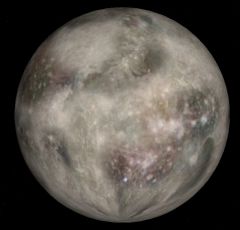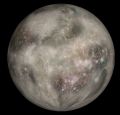Difference between revisions of "Pan"
Jump to navigation
Jump to search
(Added category.) |
(Added infobox, table, images, content.) |
||
| Line 1: | Line 1: | ||
| − | Pan is | + | {| cellpadding="2" cellspacing="0" style="margin:25px 0 0 10px; border:3px solid lightsteelblue;width:250px; font-size:90%; font-family:'Arial','Helvetica'; float: right; clear: right;"Template in Orbiter" |
| + | !bgcolor="lightsteelblue" colspan="2" align="center" |Pan | ||
| + | |- | ||
| + | |colspan="2" align="center"|[[Image:Pan-isaturnzip.jpg|240px]] | ||
| + | |- | ||
| + | |colspan="2" align="center"|'''Pan from isaturn.zip in Orbiter 2002''' | ||
| + | |- | ||
| + | !bgcolor="lightsteelblue" colspan="2"|Designation | ||
| + | |- | ||
| + | |Name||align="right"|Pan | ||
| + | |- | ||
| + | |width="30%"|Reference body||align="right" width="30%"|Saturn | ||
| + | |- | ||
| + | !bgcolor="lightsteelblue" colspan="2"|Planetary mean orbits | ||
| + | |- | ||
| + | |width="30%"|Epoch||align="right" width="50%"|1999.0 | ||
| + | |- | ||
| + | |width="30%"|Semimajor axis (a)||align="right" width="50%"|133600000 m | ||
| + | |- | ||
| + | |width="30%"|Eccentricity (e)||align="right" width="30%"|0.0001 | ||
| + | |- | ||
| + | |width="30%"|Inclination (i)||align="right" width="30%"|0° <br> (0 radian) | ||
| + | |- | ||
| + | |width="30%"|Longitude of the ascending node (LAN, ☊)||align="right" width="30%"|0° <br> (0 radian) | ||
| + | |- | ||
| + | |width="30%"|Longitude of periapsis (ϖ)||align="right" width="30%"|140.3230936° <br> (2.4491 radian) | ||
| + | |- | ||
| + | |width="30%"|Mean longitude (L)||align="right" width="30%"|240.4933049° <br> (4.1974 radian) | ||
| + | |- | ||
| + | !bgcolor="lightsteelblue" colspan="2"|Selected physical parameters | ||
| + | |- | ||
| + | |width="30%"|Mean radius||align="right" width="30%"|9960 m | ||
| + | |- | ||
| + | |width="30%"|Mass||align="right" width="30%"|1.2×10<sup>15</sup> kg | ||
| + | |- | ||
| + | |width="30%"|Note||align="right" width="30%"|*Elements given are from Pan.cfg (isaturn.zip) | ||
| + | |} | ||
| + | |||
| + | Pan is the innermost [[Natural satellite|moon]] of [[Saturn]]. It orbits inside of the [[w:Rings of Saturn#Encke Gap|Encke Gap]] in Saturn's [[w:Rings of Saturn#A Ring]] acting as a shepherd keeping the Encke Gap clear. Pan was imaged by [[w:Voyager 2|Voyager 2]] during its flyby of Saturn in 1981. Pan was predicted by Jeffrey N Cuzzi and Jeffrey D Scargle in 1985 based on the characteristics of the gap, then was found in a number of images. | ||
| + | |||
| + | == Pan in Orbiter == | ||
| + | Pan was introduced to Orbiter with the release of ''isaturn.zip'' in 2002. | ||
| + | |||
| + | {|class="wikitable sortable” style="text-align: center" | ||
| + | |- | ||
| + | |colspan="8"|<center>'''Orbiter versions and add-ons which include Pan'''</center> | ||
| + | |- | ||
| + | !Add-on!!Source!!Version!!Author!!Type!!Release Date!!Compatibility!!Wiki article | ||
| + | |- | ||
| + | |[https://library.avsim.net/esearch.php?DLID=&Name=&FileName=isaturn.zip&Author=&CatID=root Inner Moons of Saturn]||AVSIM||||Rolf Keibel||Scenery||15 October 2002|||| | ||
| + | |} | ||
| + | |||
| + | == See also == | ||
| + | [[w:Pan (moon)|Pan]] at [[w:Wikipedia|Wikipedia]] | ||
| + | |||
| + | == Gallery == | ||
| + | <gallery> | ||
| + | Pan-isaturnzip.jpg|<center>Pan from ''isaturn.zip'' in Orbiter 2002</center> | ||
| + | Pan color PIA21449.png|<center>Pan as seen by [[w:Cassini-Huygens|Cassini]] on 7 March 2017</center> | ||
| + | </gallery> | ||
| + | |||
| + | {{SaturnSat}} | ||
| + | {{SolarSystem}} | ||
[[Category: Articles]] | [[Category: Articles]] | ||
| − | + | [[Category:Celesstial bodies]] | |
| + | [[Category:Natural satellites]] | ||
| + | |||
{{Nsat-Stub}} | {{Nsat-Stub}} | ||
Revision as of 11:26, 4 August 2024
Pan is the innermost moon of Saturn. It orbits inside of the Encke Gap in Saturn's w:Rings of Saturn#A Ring acting as a shepherd keeping the Encke Gap clear. Pan was imaged by Voyager 2 during its flyby of Saturn in 1981. Pan was predicted by Jeffrey N Cuzzi and Jeffrey D Scargle in 1985 based on the characteristics of the gap, then was found in a number of images.
Pan in Orbiter
Pan was introduced to Orbiter with the release of isaturn.zip in 2002.
| Add-on | Source | Version | Author | Type | Release Date | Compatibility | Wiki article |
|---|---|---|---|---|---|---|---|
| Inner Moons of Saturn | AVSIM | Rolf Keibel | Scenery | 15 October 2002 | |||
See also
Gallery
Pan as seen by Cassini on 7 March 2017
| edit The Solar System | |
|---|---|
| Central star |
Sun (Sol) |
| Planets |
Mercury - Venus - Earth - Mars - Jupiter - Saturn - Uranus - Neptune |
| Natural satellites |
Moon - Phobos - Deimos - Io - Europa - Ganymede - Titan - more... |
| Add-ons |
Planets - Dwarf Planets - Small objects - Natural satellites - Alternative star systems |
 | This natural satellite related article is a stub. You can help Orbiterwiki by expanding it.
|


